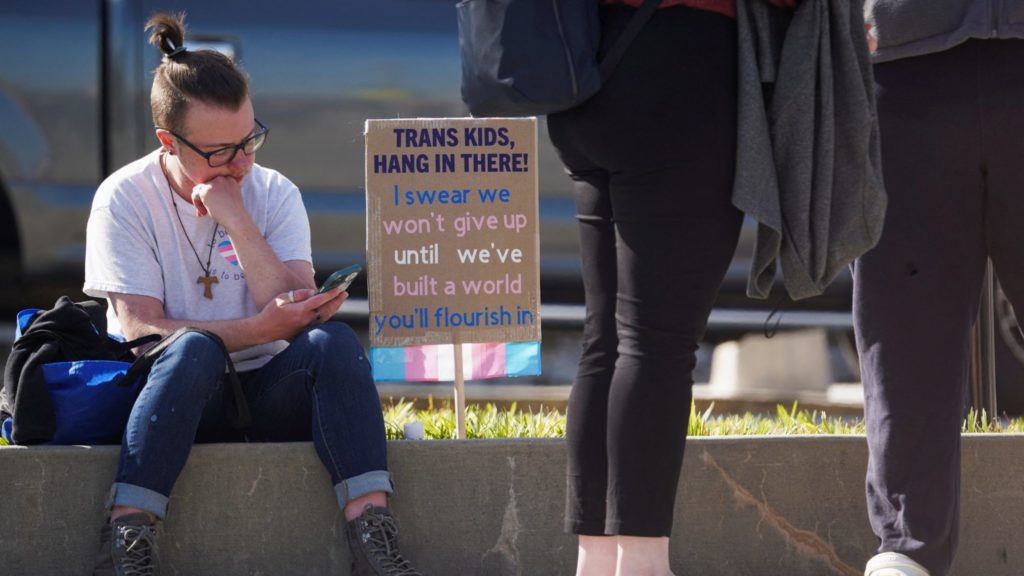The U.S. Senate Judiciary Committee held a hearing June 21 examining efforts in some states to ban gender reassignment surgery or other treatments for minors, as well as bills to prevent student athletes who identify as transgender from competing on sports teams opposite their biological sex.
The hearing, titled, "Protecting Pride: Defending the Civil Rights of LGBTQ+ Americans," mostly centered on the increasingly controversial issue of gender dysphoria. So far 22 U.S. have enacted laws to ban transgender athletes who are biologically male from competing against female athletes, according to data from the Movement Advancement Project, an LGBTQ+ policy group. Meanwhile, 20 states have enacted bans on gender reassignment surgery or hormonal treatments for minors, although not all of those bans are currently in effect.
Supporters of prohibitions on surgical or hormonal treatments for minors who identify as transgender say such efforts will prevent them from making irreversible decisions as children they may later come to regret as adults. Critics of such measures argue that preventing those interventions could cause other harm to minors, such as mental health issues or an increased risk of self-harm.
Sen. Dick Durbin, D-Ill., chair of the committee, argued that "right now, extremist politicians across America are targeting our LGBTQ youth, along with the medical professionals who care for them and the parents who love them."
"We have a responsibility to support all of our children no matter how they identify," Durbin said.
However, Sen. Lindsey Graham, R-S.C., ranking member of the committee, said the state "has every interest in protecting minor children regarding a medical procedure that is life-altering."
"I think there are a lot of people in this country very much worried about where we're headed as a nation, particularly when it comes to young girls having to compete against biological males," Graham said.
Witnesses included Kelley Robinson, president of the Human Rights Campaign; Dr. Ximena Lopez, a pediatric endocrinologist; former University of Kentucky swimmer Riley Gaines; Matt Sharp, senior counsel and director of the Center for Legislative Advocacy at Alliance Defending Freedom. Witnesses also included Harleigh Walker, a student from Alabama who identifies as transgender.
Gaines testified that she faced an unfair disadvantage as a college athlete when competing against Lia Thomas, a transgender athlete who is biologically male. Thomas had previously competed in men's swimming, but shot up to No. 1 in the women's swimming category, after capturing the NCAA Division I championship in 2022.
Gaines also said she was forced to share a locker room with Thomas, to her own discomfort and that of other athletes.
"A swimming locker room is not a place of modesty," Gaines said. "You're undressing, you're fully exposed, and we were forced to take off our swimsuits in front of a man who was doing the exact same thing."
Walker testified about experiencing bullying at school while undergoing a transition process, and told lawmakers, "No one suggested, forced or influenced me to choose to be trans, because it is not a choice."
Walker said, "One of the things that stuck out to me and my parents" about the doctors they consulted "was that if I ever decided to stop or change my mind that it was OK."
There is no clear data on how many athletes -- students or otherwise -- who identify as transgender compete on teams opposite their biological sex in the U.S., as many sports associations do not track those numbers.
A 2022 study by the UCLA School of Law Williams Institute found that there are approximately 1.6 million people in the U.S. ages 13 and older who identify as transgender, with an estimated 300,000 of that population who are minors.
In guidance on health care policy and practices released March 20, the U.S. Conference of Catholic Bishops' Committee on Doctrine said it opposed interventions that "involve the use of surgical or chemical techniques that aim to exchange the sex characteristics of a patient's body for those of the opposite sex or for simulations thereof."
"Any technological intervention that does not accord with the fundamental order of the human person as a unity of body and soul, including the sexual difference inscribed in the body, ultimately does not help but, rather, harms the human person," the doctrinal note said.
The U.S. bishops at their spring assembly in Orlando voted overwhelmingly June 16 to begin a process that could integrate the doctrinal note into revised "Ethical and Religious Directives for Catholic Health Care Services."
Several Catholic dioceses also have begun crafting pastoral approaches to gender dysphoria. The Diocese of Sioux Falls, South Dakota, issued in 2022 new guidelines for transgender youth directing diocesan schools to demonstrate "conformity with the student's biological sex as determined from conception and manifest at birth and at the time of the student's enrollment."
The Diocese of Des Moines, Iowa, issued in January guidance and policies on ministering to people experiencing gender dysphoria, calling for coherence with the church's teaching on the inseparability of gender from biological sex while emphasizing pastoral compassion for children or adults experiencing conflict between their biological sex and gender.
Likewise, the Archdiocese of Portland, Oregon, issued a 17-page teaching document called "A Catholic Response to Gender Identity Theory" from Archbishop Alexander K. Sample that same month, which also outlines the catechesis and pastoral guidelines for the archdiocese.

